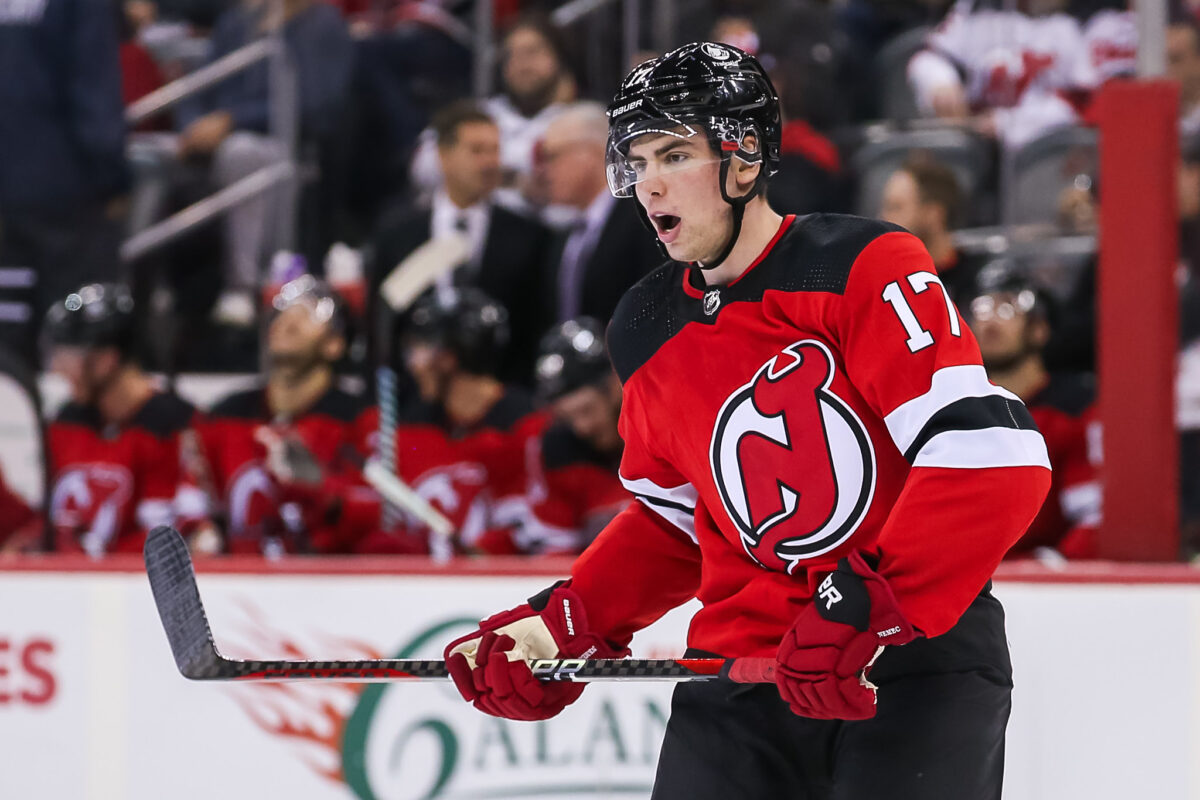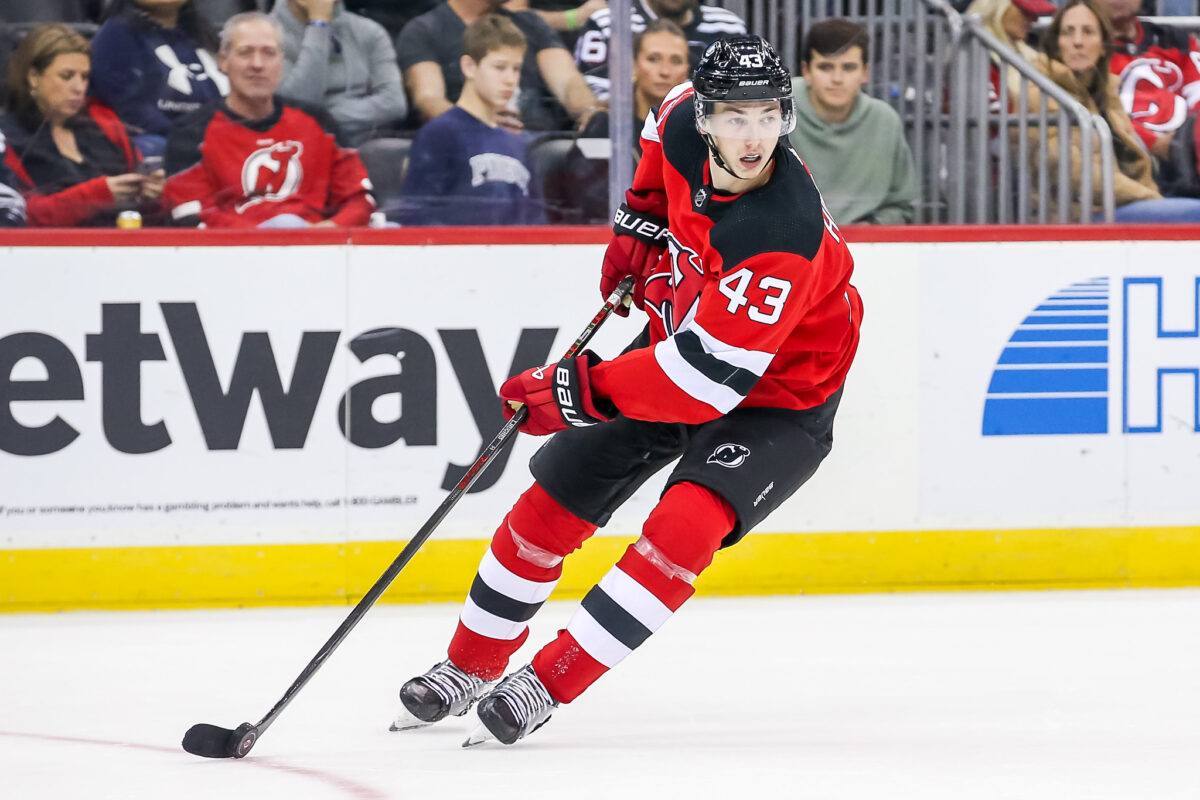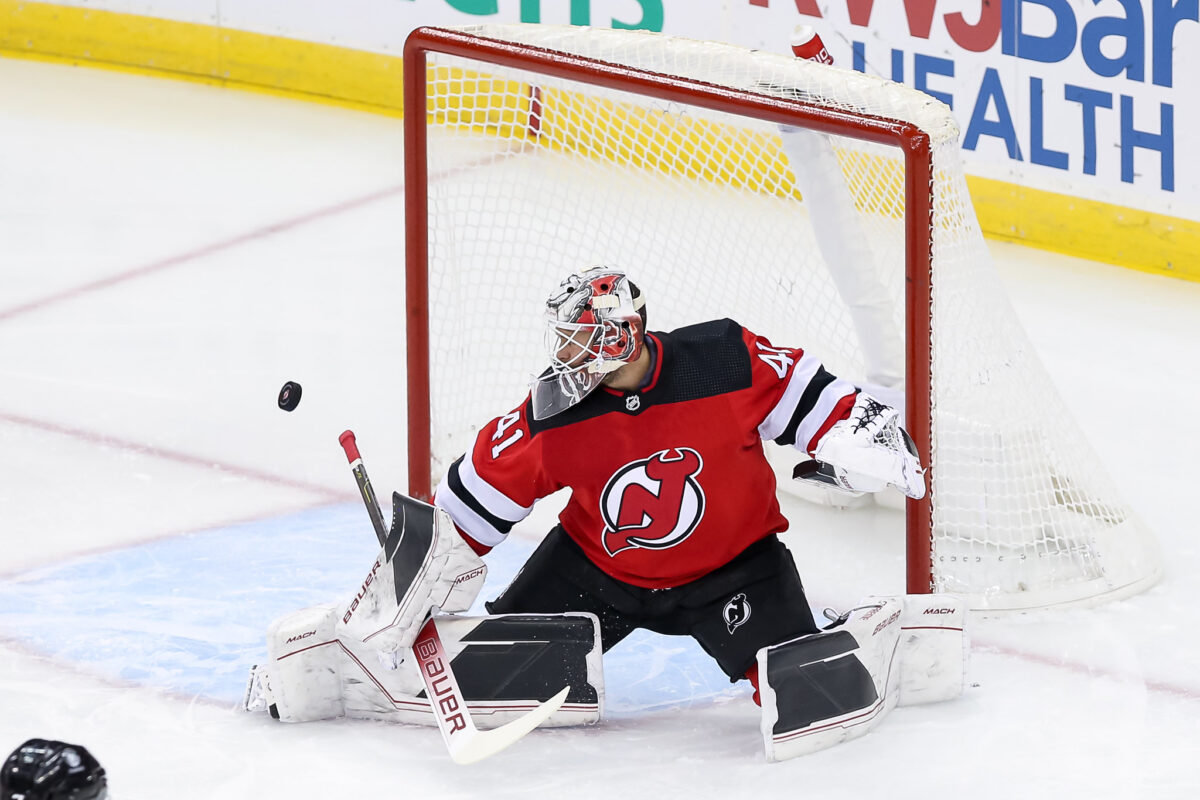Nobody likes to admit it, but there are certain games that players and coaches circle on the schedule and count as wins before the season even begins. After emotional victories over their division rivals, the Philadelphia Flyers and New York Islanders, earlier in the week, the Devils entered Friday night with an opportunity to extend their win streak to four against the team with the worst point percentage in the NHL. Unfortunately for New Jersey, nobody told San Jose that they were expected to look like a last-place team on the back end of consecutive games in two days. Instead, the Sharks absorbed sustained New Jersey pressure all night and exploited coverage errors and poor goaltending to embarrass the overconfident Devils. Here is a look at what went wrong on what should have been the triumphant debut of prized prospect Simon Nemec and instead turned into a nightmarish microcosm of the entire season.

The team has struggled all season in three distinct areas: finishing, defensive coverages/puck management, and goaltending. Each played a major role in the loss to San Jose. The best way to explain this statistically is that at 5v5 New Jersey has the third highest expected goal share with 54%. However, they have only scored 43% of the goals at 5v5, meaning that they are giving up more goals than they should AND not scoring the goals they should. Moneypuck.com still has the Devils at over 75% to make the playoffs, and expectations remain high. However, their issues will not correct themselves simply with the healthy return of players. The team has to hope that the extended road trip ahead will allow them to come together and fix these issues; otherwise, they are likely to be in for a wildly inconsistent year.
Gotta Score to Win
The numbers are absurd. The Devils put more shots on goal in the third period (23) than the Sharks had the entire game (18). The scoring chances were lopsided (58-17); again, New Jersey had more chances in the third period alone than San Jose had the entire game. The only stat not tilted in New Jersey’s favor was, unfortunately for them, the only one that counts: the score. The Devils currently rank 28th in the league in shooting percentage at 5v5, scoring at a rate of 7.4%. The rate has increased since the return of Nico Hischier and Jack Hughes, but for a team with as much scoring talent as New Jersey, 7.4% is abysmal.
The Sharks were able to follow a formula that worked well for teams like Columbus and others, essentially by denying rush opportunities, clogging the slot, and blocking shots. The Devils far too often settled for outside shots and were unable to pounce on rebounds to convert opportunities. When asked after the game if he felt snake-bitten due to the disparity of shots, Timo Meier paused and lamented, “Yes and no. You can play all you want on the outside, and you just have to get it inside. Today, we were trying to outscore the other team, and they just stayed tight; we just didn’t do a good enough job. In the o zone, we were too much on the outside, and that isn’t how you are going to score goals. We’ve gotta do a better job getting inside, getting in front of the goalie’s eyes.”
Related: Devils’ December 2023 Preview
In his post-game availability, head coach Lindy Ruff also discussed the lack of opportunities derived from failing to get to the front of the net. “First, you have to get in front of the goalie. I can reference a shift in the second period where we had (the puck in the offensive zone) for 40 seconds, and not once did anyone go to the net front.” These issues are correctable, and scoring should not be a problem for this team as they are currently fifth in the NHL in goals per game, but if they continue to experience issues on the back end, they will need to convert at a higher rate than 7.4% to win games.
Managing the Puck
Throughout the season, Ruff has harped on the Devils’ puck management as the main culprit when breakdowns occur. Whether it is defensemen making poor decisions at the offensive blue line and failing to get pucks in deep or penalty kill units unable to clear the puck out of the zone, these mistakes have cost the team goals and games this season. The Sharks game was no exception. Ruff pointed to the inability to get the puck out of the zone and win a wall battle as the genesis of San Jose’s first goal. Relying on younger, inexperienced players, it is not surprising that there will be mistakes in managing situations, but the Devils have been unable to weather the storms created by the careless play.

Generally, the Devils have done a better job managing the puck to deny odd-man rush opportunities this week, but they are still seeking consistency. Nemec’s debut will likely be remembered for his two-point effort and stewardship of the power play. However, his failures in the defensive zone directly resulted in at least two of the goals against. In the now long-term absence of Dougie Hamilton, Nemec will have an opportunity to cement his place as an NHL defenseman. How long he stays in the NHL this season will correlate with how quickly he can acclimate to the game’s speed and manage the puck.
Nemec’s fellow rookie, Luke Hughes, has also had to work on learning how to manage the puck at both ends, and his improvement has been noticeable and earned him increased ice time in critical moments. Nemec was noticeably upset when he was demoted to begin the season. How he manages the puck will determine whether he ever plays another game in Utica.
Goaltending
With both Vitek Vanecek and Akira Schmid each playing in at least ten games, it is clear the Devils must address their goaltending. After Vanecek’s success last year in the regular season, followed by Schmid’s heroic postseason performance against the New York Rangers, general manager Tom Fitzgerald’s decision to bring both men back as a tandem seemed at least reasonable. Sure, the team flirted with adding a big-name netminder over the summer but chose not to commit the huge asset capital it would have required to obtain and sign Connor Hellebuyck. They are currently paying dearly for that decision.

For the most part, Ruff has shielded blame away from his goaltenders as the season has progressed, instead choosing to blame the poor puck management or coverage errors. It appears his patience is beginning to erode. In an unusual move for the coach, he deployed Schmid on both ends of a back-to-back, saying that he wanted to reward him for earning the victory in Philadelphia. What was unsaid is that the team is rapidly losing confidence in Vanecek and chose to keep him on the bench against the lowest-scoring road team in the league rather than give him a chance to bolster his confidence. Even more telling was keeping him on the bench when it was clear Schmid was having a difficult night.
“You got to get a save on one or two of those. You have to get some timely saves. Were they bad goals? No. But you’ve got to get some timely saves.”
Lindy Ruff
The stats are not pretty in the net. Depending on your stat service, the team is either 31st or 32nd in team save percentage at 5v5. They are 30th in high-danger save percentage and have given up nearly 11 goals above expected just at 5v5, which is the worst in the NHL. When combined with the failure to score when expected at 5v5, the Devils have an overall expected goal deficit of 20 goals. Fitzgerald is running out of time to address the goaltending issue. He said early in the season that he needed 25 games to evaluate his team and determine needs accurately. After the 22nd game, he may be unable to wait three more. There is no simple fix in goal. They can take a flyer on American Hockey League (AHL) goalies Keith Kinkaid or Erik Kallgren, sign a goalie off the street like Jaroslav Halak, or make a trade. Whichever course he decides to take, what is clear is they can no longer justify not doing anything.
One of the mantras around the Devils this year is the term connected. What is certain is that the issues that cropped up against San Jose are not new this season and are all interconnected. Improving finishing will put less pressure on an inexperienced defense, which should help shelter goaltenders who are enduring a tough stretch. On the other hand, goaltenders making timely saves will imbue confidence in the defenders and allow the forwards to press less and find the back of the net. Perhaps a four-game West Coast trip is the perfect prescription for a team looking to connect and find consistency. The bottom line is that the issues must be addressed, or they are in for a season of inconsistency premised on disconnect.
